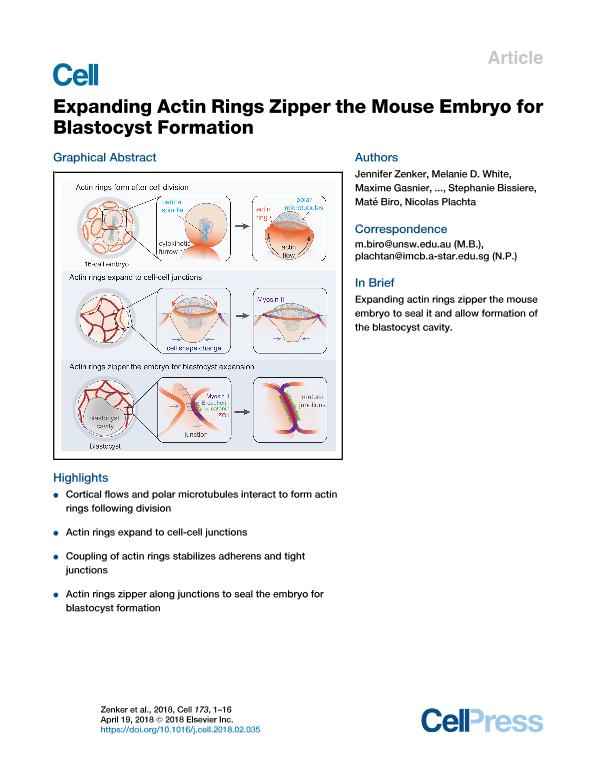Mostrar el registro sencillo del ítem
dc.contributor.author
Zenker, Jennifer
dc.contributor.author
White, Melanie D.
dc.contributor.author
Gasnier, Maxime
dc.contributor.author
Alvarez, Yanina Daniela

dc.contributor.author
Lim, Hui Yi Grace
dc.contributor.author
Bissiere, Stephanie
dc.contributor.author
Biro, Maté
dc.contributor.author
Plachta, Nicolas
dc.date.available
2020-01-08T21:20:42Z
dc.date.issued
2018-04
dc.identifier.citation
Zenker, Jennifer; White, Melanie D.; Gasnier, Maxime; Alvarez, Yanina Daniela; Lim, Hui Yi Grace; et al.; Expanding Actin Rings Zipper the Mouse Embryo for Blastocyst Formation; Cell Press; Cell; 173; 3; 4-2018; 776-791.e17
dc.identifier.issn
0092-8674
dc.identifier.uri
http://hdl.handle.net/11336/94046
dc.description.abstract
Transformation from morula to blastocyst is a defining event of preimplantation embryo development. During this transition, the embryo must establish a paracellular permeability barrier to enable expansion of the blastocyst cavity. Here, using live imaging of mouse embryos, we reveal an actin-zippering mechanism driving this embryo sealing. Preceding blastocyst stage, a cortical F-actin ring assembles at the apical pole of the embryo's outer cells. The ring structure forms when cortical actin flows encounter a network of polar microtubules that exclude F-actin. Unlike stereotypical actin rings, the actin rings of the mouse embryo are not contractile, but instead, they expand to the cell-cell junctions. Here, they couple to the junctions by recruiting and stabilizing adherens and tight junction components. Coupling of the actin rings triggers localized myosin II accumulation, and it initiates a tension-dependent zippering mechanism along the junctions that is required to seal the embryo for blastocyst formation. Expanding actin rings zipper the mouse embryo to seal it and allow formation of the blastocyst cavity.
dc.format
application/pdf
dc.language.iso
eng
dc.publisher
Cell Press

dc.rights
info:eu-repo/semantics/openAccess
dc.rights.uri
https://creativecommons.org/licenses/by-nc-sa/2.5/ar/
dc.subject
ACTIN DYNAMICS
dc.subject
BLASTOCYST
dc.subject
CORTICAL FLOW
dc.subject
EPITHELIA
dc.subject
LIVE IMAGING
dc.subject
MAMMALIAN DEVELOPMENT
dc.subject
MICROTUBULES
dc.subject
MORPHOGENESIS
dc.subject
PREIMPLANTATION MOUSE EMBRYO
dc.subject
TIGHT JUNCTIONS
dc.subject.classification
Biología Celular, Microbiología

dc.subject.classification
Ciencias Biológicas

dc.subject.classification
CIENCIAS NATURALES Y EXACTAS

dc.title
Expanding Actin Rings Zipper the Mouse Embryo for Blastocyst Formation
dc.type
info:eu-repo/semantics/article
dc.type
info:ar-repo/semantics/artículo
dc.type
info:eu-repo/semantics/publishedVersion
dc.date.updated
2019-10-24T19:36:41Z
dc.journal.volume
173
dc.journal.number
3
dc.journal.pagination
776-791.e17
dc.journal.pais
Estados Unidos

dc.description.fil
Fil: Zenker, Jennifer. Institute Of Molecular And Cell Biology; Singapur
dc.description.fil
Fil: White, Melanie D.. Institute Of Molecular And Cell Biology; Singapur
dc.description.fil
Fil: Gasnier, Maxime. Institute Of Molecular And Cell Biology; Singapur
dc.description.fil
Fil: Alvarez, Yanina Daniela. Consejo Nacional de Investigaciones Científicas y Técnicas. Oficina de Coordinación Administrativa Ciudad Universitaria. Instituto de Química Biológica de la Facultad de Ciencias Exactas y Naturales. Universidad de Buenos Aires. Facultad de Ciencias Exactas y Naturales. Instituto de Química Biológica de la Facultad de Ciencias Exactas y Naturales; Argentina
dc.description.fil
Fil: Lim, Hui Yi Grace. Institute Of Molecular And Cell Biology; Singapur
dc.description.fil
Fil: Bissiere, Stephanie. Institute Of Molecular And Cell Biology; Singapur
dc.description.fil
Fil: Biro, Maté. Institute Of Molecular And Cell Biology; Singapur
dc.description.fil
Fil: Plachta, Nicolas. Institute Of Molecular And Cell Biology; Singapur
dc.journal.title
Cell

dc.relation.alternativeid
info:eu-repo/semantics/altIdentifier/url/https://www.sciencedirect.com/science/article/pii/S0092867418302125
dc.relation.alternativeid
info:eu-repo/semantics/altIdentifier/doi/http://dx.doi.org/10.1016/j.cell.2018.02.035
Archivos asociados
